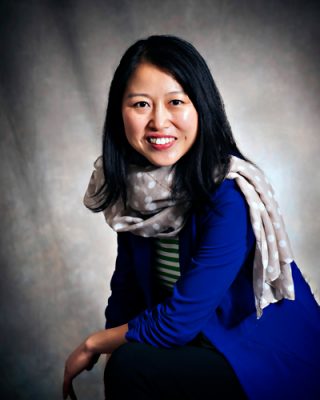A child of the 1980s with memories of her grandparents living without electricity, Professor Baozhen Luo often thinks about how much China has changed in her lifetime.
The global health expert’s reflections hold added poignancy now she is returning to the country as the new co-director of Duke Kunshan University’s Center for the Study of Contemporary China (CSCC) after nearly two decades in the United States.

Founded in 2018 as the focal point for DKU’s scholarly exploration of modern China, the center provides platforms for in-depth collaboration between faculty from all over the world and promotes high-quality research into the social, historical, economic and political factors shaping the country today.
Luo joined Duke Kunshan as a professor of global health at the start of the year before taking up the post of CSCC co-director in May. A graduate of Nanjing University, she obtained a Ph.D. from Georgia State University and was a sociology professor at Western Washington University.
Luo is keenly aware of the gulf between the life opportunities available to her and those who brought her up. In the mid-1990s, her parents worked hard to earn a combined monthly salary of 200 yuan, about 330 yuan (US$50) in today’s money. Her maternal grandmother was illiterate and a child bride at 10 years old.
“I remember in the summer I would go to see my grandparents and they were still using kerosene for lighting,” said Luo, who grew up in a small town in Jiangxi province.
“But just within my short lifetime, China is now into cashless society; it has leapt from people living without electricity to the age of AI [artificial intelligence] and smartphones.
“My grandmother couldn’t write, my mom barely had an elementary school education due to financial hardships and here I am with a Ph.D. degree, doing research, a professor and able to see the world. It gives me goosebumps just thinking about it.”

She feels “incredibly grateful” for the opportunities offered to her both by her “resilient and loving” family and through being part of the generation riding the wave of China’s meteoric rise.
“It’s a reflection of how China transformed itself from an agricultural society into this knowledge and technology-based, education-focused, forward-thinking society. It’s kind of light years away. At times it felt dizzying, for sure, I had to really find ways to ground myself.”
Luo said she was drawn to DKU by its unique status as a Sino-U.S. partnership based in China and rooted in the liberal arts tradition, as well as the open-minded, international outlook of its students, faculty and staff.
Having taught overseas for 14 years, she said the world still had much to learn about China.
“Despite its presence in the world — the rising junior superpower in terms of economic, political and soft power — I think awareness about China is quite low.
“There is a lack of understanding among academics as well as the public. DKU is particularly attractive in the sense that it is shifting that Western-centric gaze.
“It’s in China, it’s international, it’s open to the world and we attract a particular crowd with a very open outlook, understanding China in a more complex, nuanced and sophisticated way.”
A regular commentator in the media, Luo’s research has focused on population aging, social change and care policies within a global context, while her teaching interests include social gerontology and contemporary Chinese society.

As China grows older demographically, Luo predicted significant shifts in terms of occupational structure, with greater focus on technology, the harnessing of education and more investment in care provision in the economy to ensure the workforce is equipped to meet the demands of an increasingly large elderly population.
Luo said China had been transforming, not least in cities like Suzhou and Kunshan, from a labor-intensive economy to an innovation-based one that is less reliant on workers, while at the same time seeking to tackle unemployment and underemployment through upskilling the population to develop a more socially and environmentally sustainable economy.
AI could mark the end of not just manual jobs but also professional roles, Luo suggested.
“In many ways I think that AI will replace quite a few jobs and in ways that could solve the labor force shortages,” she added.
“This is going to pan out really interestingly in terms of occupational structure.”
Her own research at DKU will include looking at China’s care economy on a broad level and more specifically examining training programs for care workers in the Suzhou and Shanghai area, exploring themes such as competence and recognition.
As CSCC co-director her mission is to advance the high-quality research and teaching found across all fields of study at DKU on contemporary China, showcasing the outstanding contributions from faculty and students to the global knowledge pool.

That work includes influential research covering a huge variety of topics such as the applications of blockchain technology, social media’s impact on diet, the third-child policy, homelessness, human/machine interactions and soil pollution.
“My role is to support the faculty, especially junior faculty members, as well as our students to foster collaborations and to help build a sense of community within DKU as well as to build a global network,” she said.
“There is so much richness within the DKU community when it comes to understanding contemporary China.
“I think the center is uniquely positioned to really harvest this vitality, energy and the open outlook within our community and translate that into research and teaching, broadening our minds individually and collectively.”
Visit https://www.dukekunshan.edu.cn/cscc/ to find out more about the center.

